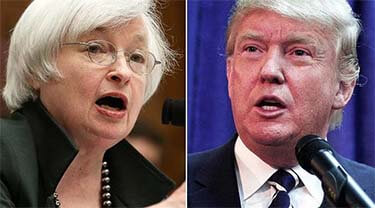Ricochet is the best place on the internet to discuss the issues of the day, either through commenting on posts or writing your own for our active and dynamic community in a fully moderated environment. In addition, the Ricochet Audio Network offers over 50 original podcasts with new episodes released every day.
 On Fiscal Stimulus, Yellen Is “Meh,” While Trump Is “More!”
On Fiscal Stimulus, Yellen Is “Meh,” While Trump Is “More!”
 There seems to be an economic disagreement between the current Fed and the future White House. The central bank on Wednesday raised its benchmark short-term interest rate for the first time in a year, with perhaps three more moves in 2017. And at the post-meeting press conference, Fed boss Janet Yellen was kinda-sorta “meh” on the idea that the US economy needed a big dose of fiscal stimulus. It probably did a bit earlier in the recovery, but not now.
There seems to be an economic disagreement between the current Fed and the future White House. The central bank on Wednesday raised its benchmark short-term interest rate for the first time in a year, with perhaps three more moves in 2017. And at the post-meeting press conference, Fed boss Janet Yellen was kinda-sorta “meh” on the idea that the US economy needed a big dose of fiscal stimulus. It probably did a bit earlier in the recovery, but not now.
Here’s Yellen:
I believe my predecessor and I called for fiscal stimulus when the unemployment rate was substantially higher than it is now. With a 4.6% unemployment and a solid labor market, there may be some additional slack in labor markets but I would judge that the degree of slack has diminished. I would say at this point that fiscal policy is not obviously needed to provide stimulus to get back to full employment.
Indeed, as JPMorgan economist Michael Feroli noted, Yellen during here press conference also seemed to back away from the notion of running a “high-pressure economy” of robust aggregate demand and a tight labor market.
Then there’s President-elect Donald Trump, recently preaching some old-time Keynesianism to Time: “Well, sometimes you have to prime the pump. So sometimes in order to get jobs going and the country going, because, look, we’re at 1% growth.”
With apologies to an apocryphal Andrew Mellon rant: “Stimulate labor, stimulate stocks, stimulate farmers, stimulate real estate. It will purge the stagnation out of the system!”
But what if this is as good as it gets on a sustained basis without increasing the economy’s growth potential through supply-side reform? In an earlier analysis, Feroli pegs the economy’s current potential GDP growth rate at just 1.4%. As for 2017 year-over-year growth, the bank is at 2%.
Others are somewhat more optimistic. Capital Economics:
The slightly faster than previously anticipated pace of monetary tightening in 2017 is, at first glance, hard to square with the Fed’s economic projections. The median for 2017 GDP growth was revised up trivially to 2.1%, from 2.0%, while the unemployment rate forecast was revised down trivially to 4.5%, from 4.6%. But those economic projections clearly still don’t incorporate the strong possibility of a major fiscal stimulus next year. That makes sense, since officials don’t want to be accused of political meddling. But even if it isn’t explicit in the eocnomic projections, a few Fed officials clearly thought it made sense to raise their interest rate projections a little. We expect the Fed to raise rates four times next year, taking the fed funds target range to between 1.50% and 1.75% by end-2017, but we have also factored a fiscal stimulus explicitly into our forecasts and, consequently, expect GDP growth to be a stronger 2.7% in 2017.
Now 2.7% growth would be the best showing of the recovery, but only a tick better than 2015 — a year which reminded few of a boom. In any event, perhaps the Trump White House should think about structuring its economic policy to provide a long-term, supply-side lift rather than an immediate, demand-side fillip. Pay for tax reform. Look at the ROI of infrastructure spending. high-skill immigration, education, education, education.
Published in Economics



I wish we could get past this nonsense that Federal spending somehow stimulates economic output independently of what it is spent on and where the resources come from. Like any other spending the effect depends on the return to the investment and overhead. Most government spending is overhead which may or may not be necessary and doesn’t get better by merely being more expensive. Changes in tax rates affect expectations about returns and have an effect depending on rates before and after the reform and the ease of capturing or avoiding it. Studying these effects is part of economics. The thing we call macroeconomics is accounting which sometimes is useful but isn’t economics.